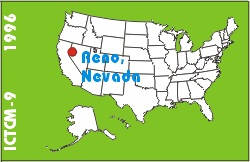
Electronic Proceedings of the Ninth Annual International Conference on Technology in Collegiate MathematicsReno, Nevada, November 7-10, 1996Paper P011IDEA: Internet Differential Equations Activities |
Thomas LoFaroDepartment of Pure and Applied Mathematics Washington State University Pullman, WA 99164-3113 USA Phone: (509) 335-3124 Fax: (509) 335-1188 lofaro@trout.math.wsu.edu | Kevin CooperDepartment of Pure and Applied Mathematics Washington State University Pullman, WA 99164-3113 USA Phone: (509) 335-3124 Fax: (509) 335-1188 kcooper@delta.math.wsu.edu list of all papers by this author |
| Click to access this paper: |
ABSTRACT
The World Wide Web (WWW) provides educators with a unique opportunity to provide students with information on a wide range of topics. Until recently, the Internet in general and the World Wide Web in particular have simply been tools for the dissemination and collection of information. But now, with the development of the Java programming language, users have the opportunity to interact with remote programs. Thus the WWW is becoming both an information source and an interactive tool. In this poster we will demonstrate one way in which mathematics educational material can be collected, distributed and/or used over the World Wide Web.We have recently been awarded a National Science Foundation grant for the development of IDEA, Internet Differential Equations Activities. IDEA is a program for the development of a ``virtual dynamic lab book'' on the WWW. IDEA is more than a repository for these activities. Activities are being developed by us and contributions are being accepted and solicited from individuals at other institutions. The IDEA site provides users with internal and external tools to mathematically explore the given activity.
To facilitate the development of modules by outside contributors we have developed a Java code generation package to be made available to the general public over the WWW. The module author can create Java applets to accompany his/her project simply by providing the differential equations and other relevant information to the code generator. The software then takes this information and creates the desired applet to be included in the developers project.
We will present these tools, demonstrate their use, and discuss methods for the evaluation and implementation of activities submitted by instructors at other institutions.
Keyword(s): differential equations, Java, Internet, programming
